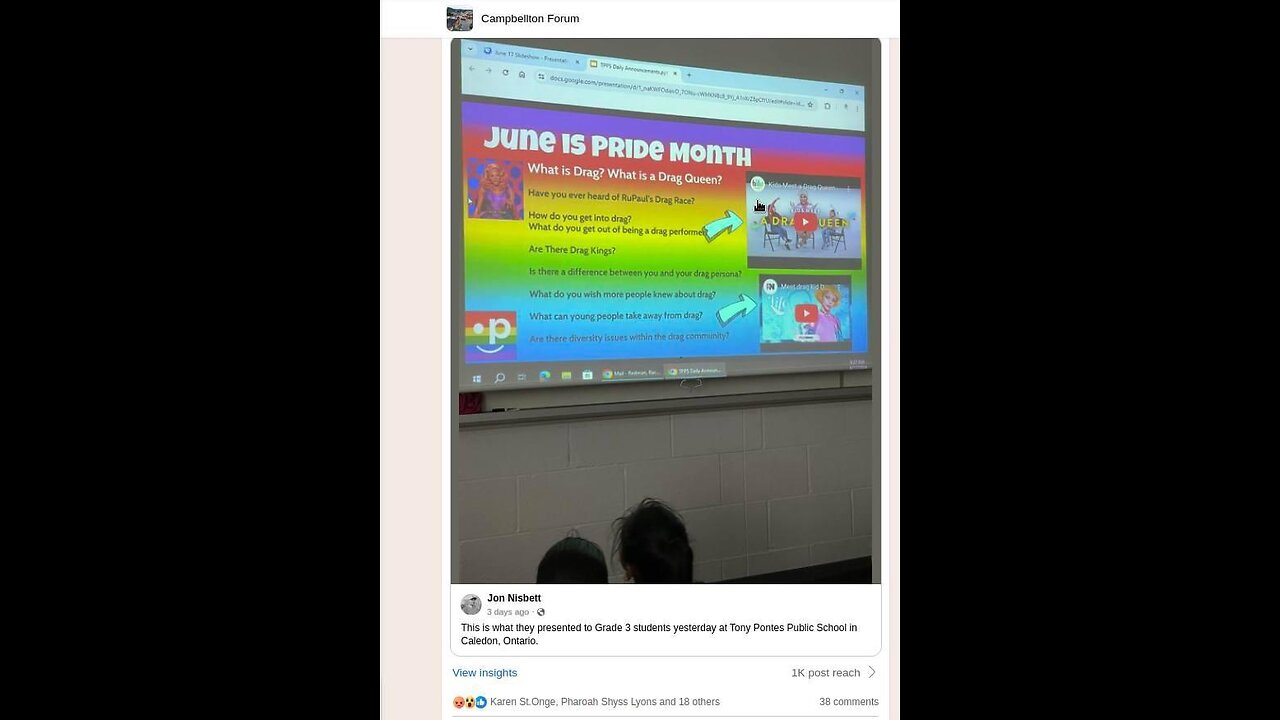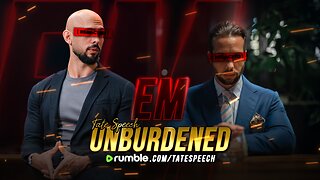Premium Only Content

Keep It Out Of The Schools! Kids Don’t Need To Know This Stuff!
FIRST DEBATE TOPIC: GENDER IDEOLOGY IN ELEMENTARY SCHOOLS
Welcome to our first debate topic in Campbellton Debate Central: Gender Ideology in Elementary Schools.
Internal Documents from .nbed.ca websites: https://files.catbox.moe/d11c80.zip
Discussion Points:
1. Educational Content: Should gender ideology be part of the curriculum in elementary schools? If so, to what extent?
2. Parental Rights: What role should parents play in deciding whether or not gender ideology is taught to their children?
3. Child Development: How does exposure to gender ideology at an early age impact child development and identity formation?
4. Social Impact: What are the broader social implications of teaching gender ideology in schools? How might it affect societal views on gender?
5. Policy and Legislation: What policies should be in place to address the inclusion of gender ideology in school curricula? Should there be federal or state regulations?
Guidelines for Discussion:
• Ensure your arguments are supported by credible sources and factual information.
• Engage respectfully with differing opinions.
• Avoid personal attacks, hate speech, and discriminatory language.
• Keep your comments focused on the topic of gender ideology in elementary schools.
• Share relevant and tasteful content that contributes to the discussion.
PROTECTIONISM IN THE SEX ED/GENDER IDEOLOGY DEBATE
IntroductionComprehensive sexual education (CSE) has been shown to offer numerous benefits beyond basic sexual health, including the reduction of sexual abuse. This highlights the importance of focusing on constructive discussions about what sex education should look like at different ages and why it is crucial.
Evidence
1. Effectiveness of CSE in Preventing Sexual Violence:Comprehensive Sexuality Education (CSE) has the potential to prevent sexual violence perpetration by addressing risk factors early in life. The integration of the National Sexuality Education Standards (NSES) into K-12 education can help mitigate risks associated with sexual violence, suggesting the importance of longitudinal research to confirm these effects (Schneider & Hirsch, 2020).
2. Broad Benefits of CSE:A review of three decades of research supports the effectiveness of school-based CSE programs. These programs enhance knowledge about sexual diversity, promote healthy relationships, prevent child sexual abuse, and improve emotional and social learning among students. The findings advocate for early and inclusive sex education beginning in elementary school (Goldfarb & Lieberman, 2020).
3. Impact on Child Self-Protective Skills:School-based education programs significantly improve children's knowledge and self-protective skills against sexual abuse. These programs have shown to increase children's abilities to identify and avoid dangerous situations, which are retained for at least six months post-intervention (Walsh et al., 2015).
PSYCHOLOGICAL ANALYSIS OF THE COMMENT THREAD
This comment thread reveals several psychological and sociological themes, including resistance to LGBTQ topics in education, concerns about developmental appropriateness, and a strong sense of parental authority and protectionism. Below is a detailed analysis of key comments and interactions:
1. RESISTANCE TO LGBTQ TOPICS IN EDUCATION
Amanda Selig Schnare:
• "Absolutely none of this trash needs to be in an elementary or middle school👿": Amanda's comment reflects a strong rejection of LGBTQ topics in school curricula, using derogatory language ("trash") and an emotive symbol (👿) to emphasize her disdain. This indicates a moral panic and a belief that such topics are harmful or inappropriate for young children.
2. PARENTAL AUTHORITY AND CONCERNS
Michael Landry:
• "Which kinda makes me wonder why theirs a LGBTQ flag at the entrance of LBS": Michael questions the presence of an LGBTQ symbol at a school, suggesting that he sees it as inappropriate or confusing for children. This reflects a sense of parental authority and control over what symbols and messages children are exposed to.
• "Like I can kinda understand middleschool, Also elementary school is run like a gossip club, and they lash out n treat parents that speak up badly.": Michael distinguishes between middle school and elementary school, indicating a belief that younger children are particularly vulnerable. He also expresses frustration with how schools handle parental concerns, suggesting a perception of being marginalized or ignored.
Elliot Mcdavid:
• "Michael Landry parents that speak truth !!!": Elliot supports Michael, reinforcing the idea that parents who oppose LGBTQ topics in schools are simply speaking the truth. This indicates a shared belief in their perspective as the correct one.
• "Michael Landry concerned parents. not hateful at all, just confused and concerned.": Elliot frames the opposition as rooted in concern and confusion rather than hatred, attempting to legitimize their stance as protective rather than prejudiced.
Pat Anderson:
• "Kids did not have sexual stuff thrown at them like this no one does what happened to sexuality is a private matter": Pat argues that discussions of sexuality should remain private and not be introduced to children, reflecting a belief in traditional boundaries and a preference for keeping such topics out of public education.
3. CONCERNS ABOUT DEVELOPMENTAL APPROPRIATENESS
Cheryl Landry:
• "So tired of this taking over our world and lives there's more important things to teach our kids than this garbage everywhere, it's like the cat thing in schools, what a joke our kid needs kitty litter at school.": Cheryl expresses frustration with what she sees as the overemphasis on LGBTQ topics at the expense of more practical education. She uses hyperbole ("kitty litter at school") to ridicule the situation, indicating a belief that these topics are trivial and inappropriate for children.
4. PROTECTIONISM AND FEAR OF HARM
Carrie Smith:
• "Children should not be groomed or have discussions about sexuality... Justice is not to be found when we let Pedophiles house children, teach children and groom children.": Carrie equates discussions of sexuality with grooming, expressing a strong protective instinct and fear of harm. Her comment reflects a belief that LGBTQ education is inherently dangerous and manipulative.
• "Having had early knowledge of Pedophiles and what they will come up with to twist the ideas of sexuality and confuse CHILDREN'S MINDS.": Carrie draws on personal experiences to reinforce her argument, suggesting that early exposure to sexuality is confusing and harmful to children.
Mitch Savoy:
• "I could care less how much anyone cries about it.. it's not normal and won't be discussed with my children. Anyone who tries to talk about sex or any topic close to it with MY kids will be met with violence.": Mitch's comment is aggressive and emphasizes parental control. He categorically rejects discussions of sexuality for his children and threatens violence, reflecting an extreme protective stance and resistance to change.
1. FEAR AND RESISTANCE TO CHANGE
Rosa Pellerin: "It absolutely should not be in the curriculum. It offends a lot of people. It confuses the kids. It's all brainwashing."
• Fear of the Unknown: Rosa's comments reflect a common fear of the unknown or unfamiliar. Introducing LGBTQ topics in school represents a significant change from traditional curricula, which can provoke anxiety and resistance.
• Cognitive Dissonance: The term "brainwashing" suggests a belief that exposure to LGBTQ topics conflicts with deeply held values, leading to cognitive dissonance. To reduce this discomfort, individuals often reject the new information.
Amanda Selig Schnare: "Absolutely none of this trash needs to be in an elementary or middle school👿"
• Moral Panic: The strong language ("trash") and emotive symbol (👿) indicate a moral panic, where a societal change is perceived as a threat to moral standards and social order.
2. SOCIAL IDENTITY AND GROUP DYNAMICS
Cheryl Landry: "very true" Elliot Mcdavid: "exactly"
• Social Proof: Both Cheryl and Elliot reinforce Rosa and Amanda's views, demonstrating social proof. When individuals see others sharing their opinion, it strengthens their belief that their stance is correct, creating an echo chamber effect.
Michael Landry: "Which kinda makes me wonder why there's an LGBTQ flag at the entrance of LBS"
• In-group/Out-group Dynamics: Michael's wonderment about the flag indicates an "us vs. them" mentality, where LGBTQ symbols are perceived as representing an out-group, fostering a sense of exclusion and opposition.
3. FAMILY DYNAMICS AND PERSONAL EXPERIENCE
Bonnie Curnew Hyde: "I have no problem with it we have many families in our our my family with LGBTQ and we love them all dearly..."
• Personal Connection and Empathy: Bonnie's acceptance of LGBTQ topics stems from personal connections. Direct experience with LGBTQ individuals can foster empathy and reduce prejudice.
• Internal Family Discussions: Bonnie believes such topics should be handled within the family, highlighting the role of family in shaping attitudes and beliefs.
Bonnie Curnew Hyde: "Nope 👎 100 percent not it’s like children thinks it’s a game..."
• Developmental Concerns: Bonnie expresses concern that children cannot understand complex social issues and may trivialize them, reflecting a common worry about age-appropriate education.
4. STEREOTYPING AND LABELLING
Danika Comeau Martin: "Predators.."
• Stereotyping: Danika's comment reflects a harmful stereotype that equates LGBTQ topics with predatory behavior, which can perpetuate stigma and discrimination.
• Moral Disgust: The term "predators" evokes moral disgust, a powerful emotional reaction that can drive social exclusion and reinforce negative attitudes.
-
 0:43
0:43
Canadian Citizens Journal
10 hours agoPrince knew what was up...back in 1999
28 -
 LIVE
LIVE
vivafrei
8 hours agoEp. 249: Confirmation Hearings RECAP! Canada-U.S. TRADE WAR? Bureaucrats Sue Trump! Viva Barnes Live
15,729 watching -
 LIVE
LIVE
Vigilant News Network
19 hours agoRFK Jr. Hearing EXPOSES Corrupt Politicians in Humiliating Scandal | Media Blackout
1,818 watching -
 LIVE
LIVE
Tate Speech by Andrew Tate
1 hour agoEMERGENCY MEETING EPISODE 105 - UNBURDENED
12,083 watching -
 1:01:18
1:01:18
Tactical Advisor
4 hours agoBuilding a 308 AR15 Live! | Vault Room Live Stream 016
42.8K5 -
 11:33
11:33
DeVory Darkins
19 hours ago $19.63 earnedJustin Trudeau PANICS after Trump slaps Canada with AGGRESSIVE Tariffs
91.4K174 -
 19:11
19:11
Stephen Gardner
1 day ago🔥HOLY CRAP! Chuck Schumer UNDER INVESTIGATION | 3 HUGE Trump MOVES explained!
102K249 -
 4:53:35
4:53:35
Rotella Games
10 hours agoGrand Theft America - GTA IV | Day 4
51K5 -
 LIVE
LIVE
Scottish Viking Gaming
7 hours ago💚Rumble :|: Sunday Funday :|: Rumble Fam Knows What's Up!!
266 watching -
 LIVE
LIVE
ttvglamourx
6 hours ago $4.05 earnedEGIRL VS TOXIC COD LOBBIES !DISCORD
294 watching